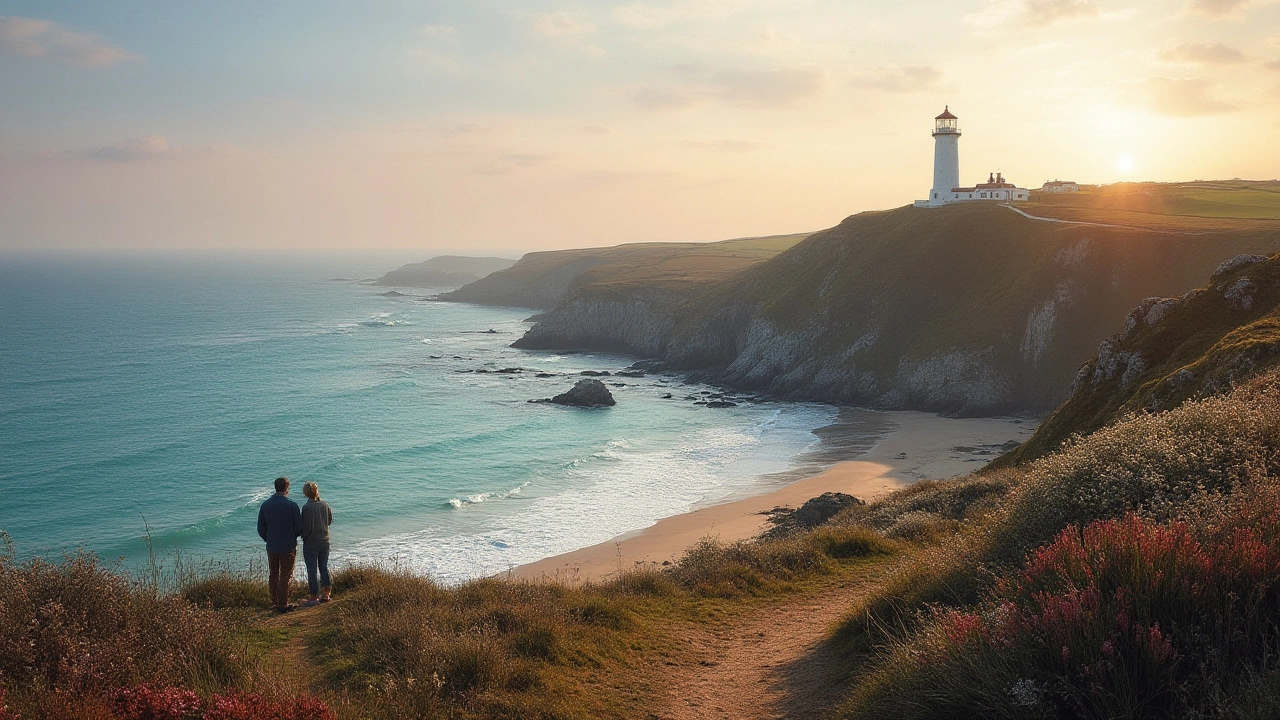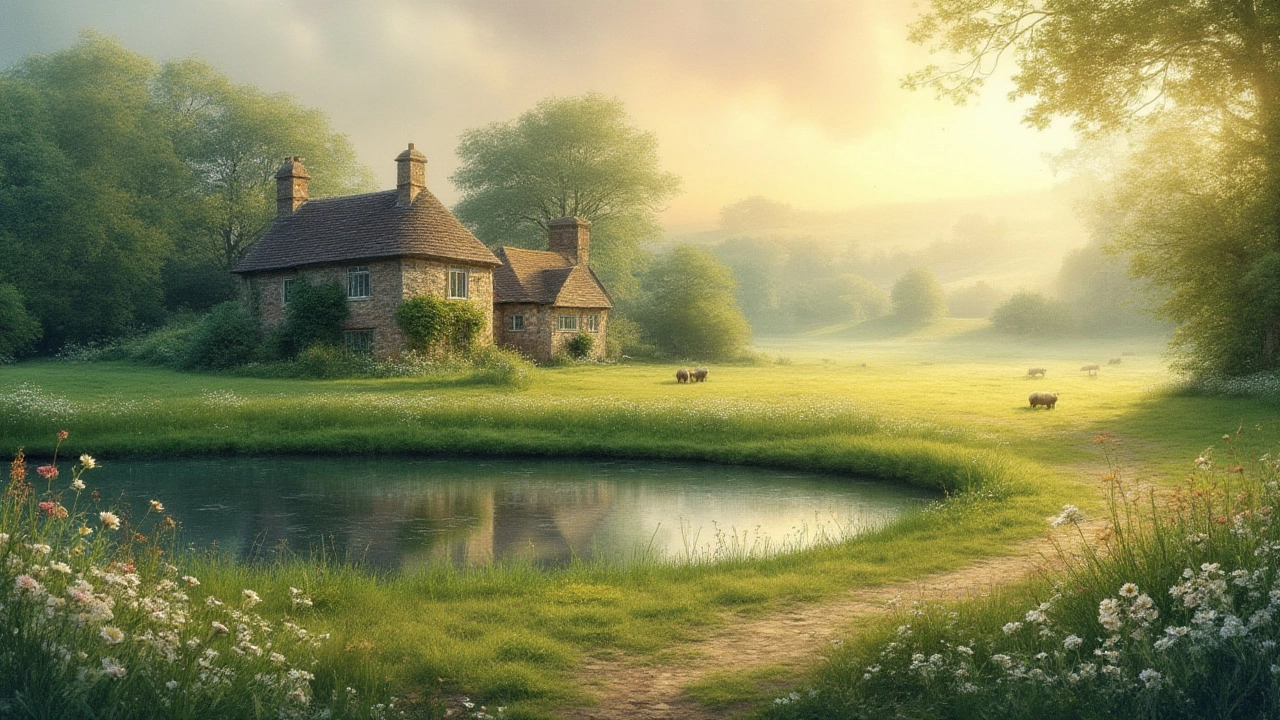Ever stumbled into a sleepy UK village where the only noise comes from the wind rustling the hedgerows and a distant moo? You can almost feel your heartbeat slow. Britain isn’t all bustling cities or postcard castles—it’s also a hidden patchwork of peaceful corners, each quietly competing for the crown of the country’s most relaxing spot. Some folks argue that it’s the dramatic Scottish lochs, others swear by Cornish beaches, while spa lovers drift towards the quiet hills of the Lake District. But the quest for pure tranquility runs deeper: it’s about the whole mood, the pace, and the little details you never expect—like the honeyed smell of gorse in bloom or the soft ooze of wet moss underfoot. So, where should you really go to unwind? Let’s settle in and explore the UK’s best-kept secrets.
The Science Behind Relaxation: Why Some Places Just Work
It’s not just imagination—science says your brain and body react to calming environments. Studies by the UK’s Mental Health Foundation show that exposure to natural beauty, green spaces, and quiet sounds like flowing water can drop cortisol levels, reduce blood pressure, and even boost your immune response. This is why wild moorlands or hidden beaches just feel different than even the poshest hotel spa in London’s Mayfair. The UK holds a huge advantage here: you never have to drive far to stumble onto a view that tugs all your racing thoughts away.
Another factor is the pace. You’ll notice the most relaxing spots in the UK can’t be rushed. Villages with crooked lanes and pubs named after long-forgotten kings, or walking trails where your only company is the occasional sheep, force you to slow your step. Even the climate helps: that soft drizzle in the Lake District might ruin your hair, but the hush it brings down makes the green hills feel like another planet. The thick, salty air on the North Norfolk Coast is rich with negative ions, which recent research says lifts mood and helps sleep. Real relaxation isn’t about ticking boxes—it’s about being nudged gently out of your usual routine.
Interestingly, the happiest communities in the UK, according to the Office for National Statistics, tend to be in places with a strong connection to unspoiled landscapes—Scottish Highlands, Welsh valleys, and certain rural stretches of Dorset and Cornwall. Folks living there report lower stress levels and better sleep. Sometimes, it isn’t the fancy hotels, but just a cup of locally grown tea enjoyed under a lopsided oak tree, that does the trick.
If you’re flying in from city life, there’s a real health benefit to unplugging somewhere with patchy phone signal. A 2023 survey by Visit Britain found 68% of UK holidaymakers claim unwinding is their top priority, and almost all said ‘natural scenery’ comes first. There’s your hint: for proper relaxation, go natural, go slower, leave your Wi-Fi behind.
| Most Common Relaxation Activities in the UK | Percentage of People Who Prefer This |
|---|---|
| Nature walks/hiking | 51% |
| Coastal escapes | 22% |
| Spa retreats | 14% |
| Wild swimming | 8% |
| Mindfulness/meditation breaks | 5% |
So, the real secret? A blend of peaceful green sights, slow living, and just enough old-world charm to make you forget the world outside. The UK is packed with places that tick all those boxes—you just need to know where to look.
Top Contenders for the Most Relaxing Place in the UK
People will argue endlessly about where the most relaxing part of the UK is—it gets surprisingly heated (in a very polite, British way, of course). Let’s break down the frontrunners, each offering its own brand of peace. Maybe you’re after mirror-still lakes, wide-open moors, or salty sea air that clears your head. Here are the standouts, with examples and what makes them so serene.
- The Lake District: It’s a cliché for a reason. Wander around Buttermere or Ullswater and your pulse just eases by itself. The trails are soft underfoot, the sheep friendly, and the pubs serve pints by a real fire. The air is famously fresh. Fun fact: Beatrix Potter not only wrote her stories here but worked to preserve the land—for the peace, not the profits.
- Northumberland Coast: If you love wild and windswept, you’ll find empty beaches where seals nap and castles peek over the dunes. Alnmouth rarely crowds, and stargazing in the Northumberland International Dark Sky Park is incredible. At night, it’s quieter than your average library.
- Cornwall’s Roseland Peninsula: The Roseland almost feels like a secret society, its tiny fishing villages only just big enough for an ice cream shop, its beaches hidden by twisting country lanes. Watergate Bay is the loudest it gets here, which is still basically silent after 8pm.
- The Isle of Skye: No list is complete without Scotland’s crown jewel. Skye isn’t just beautiful; it’s otherworldly. Misty mountains, waterfalls, and barely a soul for miles. Local B&Bs offer scones, but the real treat is just sitting and watching the weather drift over the Cuillin Hills.
- Brecon Beacons, Wales: Rolling green, dotted with sheep and dramatic hills. What people don’t tell you is how quiet sections of the Brecons really are, especially off the main paths. You might find yourself alone with just a waterfall and a silent forest for hours.
The thing about these spots—they’re not just a feast for the eyes, but for the senses. There’s a faint scent of heather, the rough feel of ancient stones, the hush of wind over grass. In Dorset’s rural villages like Cerne Abbas, time seems to pause. The Peak District’s Hathersage Moor, meanwhile, offers skylarks, tumbling streams, and daringly good tea rooms (which somehow always taste better after a chilly walk).
Another unexpected contender: the Scottish Highlands. Think Glen Etive or the shores of Loch Ness. You may not find Nessie, but you will lose your stress. Mountain air, deer grazing, and the cold clarity of loch water have turned this region into a quiet sanctuary. Fun fact: 2023 tourism numbers show more people are picking retreats here for mindfulness holidays than ever before.
City escape? Try Bath’s Roman spa waters or the luxurious spa breaks in Harrogate and Buxton. Even though they’re towns, the old stone streets, flower gardens, and bubbling springs have a proven chill effect. Victorians swore by these spots for a reason. To make it accessible, both Bath and Buxton now offer guided relaxation weekends with yoga, walks, and hot mineral baths.
The real charm is finding ‘your’ place—maybe it’s a chilly dawn paddle at Lulworth Cove, a riverside pint in Ludlow, or a lazy snooze on the Cotswolds’ soft hills. In a country this packed with peaceful corners, the “most relaxing place” really is a personal thing. But the above gives you a good shortlist.

How to Plan Your Own Relaxing UK Escape
Once you’ve got your eye on a spot, it’s tempting just to book and go. But a truly relaxing break needs some proper planning. If you’re all about de-stressing, getting the details right is crucial. First up: go off-peak. The peace of somewhere like Devon or the Scottish islands is multiplied when you’re not sharing it with crowds clutching selfie sticks. That means late spring (May-June) or autumn (September-October) for the best balance between weather and emptiness.
Travel light. Seriously, nothing ruins that post-walk nap like hauling a suitcase on country footpaths. Think sturdy boots, a book or two, and layers. Leave your suit or sparkly shoes at home. It’s also smart to pre-book places to eat—some of the best country pubs or tearooms in rural UK places fill up fast, especially on rainy days when everyone ducks inside at once.
If you’re after silence, check the accommodation carefully. Old stone cottages look dreamy but might sit beside a surprisingly noisy lane. Hunt for places far from main roads or with garden access. Extra tip: search reviews for mentions of the word ‘quiet’—it’s the most reliable way to spot somewhere genuinely peaceful.
Don’t try to pack too much in. One common trap is squeezing three locations into a long weekend. It’s better to pick a single region—say, the South Downs—book two or three nights, and really get under its skin. Go for one big walk each day, a slow lunch, and spend the afternoon sipping tea while reading (or snoozing) in the sun. Bonus points for leaving your phone in airplane mode, just to see what you miss (spoiler: not much).
- Arrive sooner rather than later—at sunset or sunrise you get whole beaches or hills nearly to yourself.
- Pack snacks. A squashed picnic of smoked salmon, oatcakes, and a thermos is worth its weight in gold when the nearest shop is miles away.
- If you visit somewhere like Northumberland or the Welsh coast, bring binoculars. Wildlife spotting (seals, rare birds, even dolphins) pairs perfectly with relaxation.
- Download trail maps or walking guides before you go. Patchy mobile signal is the norm in wild places, and it’s part of the charm.
Finally, set your own expectations. Instagram photos can make everywhere look polished and perfect, but real relaxation often comes from scruffy edges—wildflowers in the cracks, mist on the hills, and a gentle shabbiness that reminds you none of it is staged.
Hidden Gems: Underrated Relaxation Spots
The famous places get all the attention, but the UK is full of quiet corners where you’ll barely see another soul. If you want the tranquility without the crowds, check out these underrated gems:
- Isle of Eigg: Tiny, car-free, and brilliantly wild. You get big sea views, peaceful beaches, and Highland cows wandering around. The local music nights are pure magic—relaxed, unhurried, and friendly.
- North Essex Villages: Villages like Dedham and the Stour Valley are a patchwork of meadows, slow rivers, and hidden art galleries inspired by Constable’s landscapes. Cycle along quiet lanes and stop in pubs where the only noise is the clink of teacups.
- Anglesey, Wales: This island is linked by a bridge but feels a world away. The beaches stretch for miles and the historic sites—from Beaumaris Castle to Druid cemeteries—add a hint of mystery. In spring, wild garlic and bluebells cover the woods in carpets of scent and colour.
- The Yorkshire Wolds: Less famous than the Moors or Dales but every bit as pretty. Huge looping hills, rare chalk streams, and ancient woodlands are perfect for rambling. Bring a sketchpad or camera—this is a place to get lost gently, not rush around.
- South West Scotland’s Galloway Forest Park: A certified dark sky zone that’s perfect for star watchers. It’s not uncommon to spot badgers, deer, or even pine martens. The walking trails rarely see more than a few families even in peak summer.
- Llyn Peninsula, North Wales: Often skipped in favour of Snowdonia, this finger of land stretches into the Irish Sea. You’ll find hidden coves, tiny hamlets, and walks through ancient woodland. Watch the sunset over Bardsey Island—the most zen moment imaginable.
Each of these places proves you don’t need to splash out on pricey resort hotels to find calm. What you need is space, soft sounds, and a slow pace. Even experienced UK travellers end up with favourite corners off the main tourist maps—maybe a forgotten bay in Pembrokeshire, a riverside bench in Suffolk, or a shady lane in the Trossachs.
The best advice: keep your plans loose and your eyes open. The most relaxing place in the UK might be the one you stumble on by accident—a secluded bench, a forgotten glen, or a quiet lakeside pub with the best homemade shortbread you’ve ever tasted. Chase that feeling, and your UK trip becomes something more memorable than any checklist could promise.

Menu